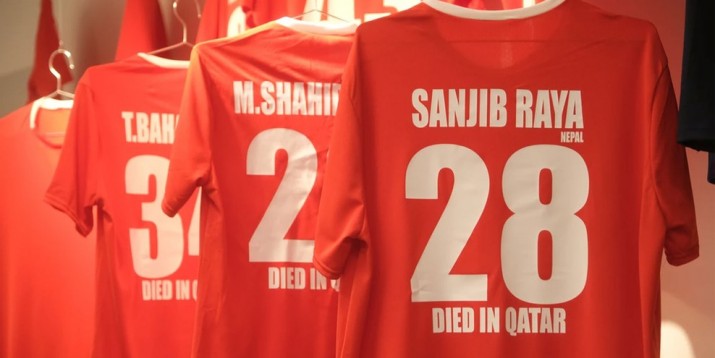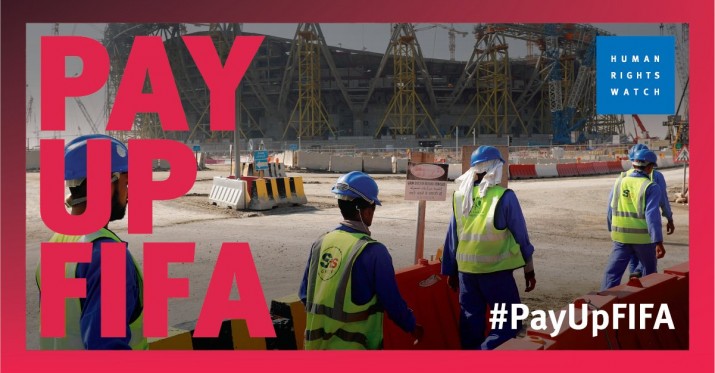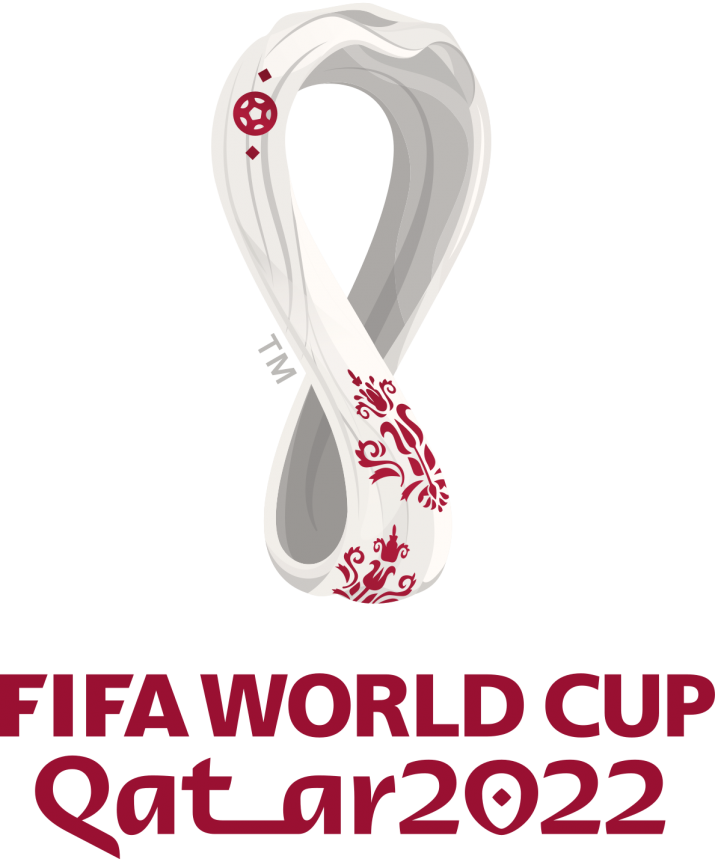Sergio Ferrari, 1/10/2022
Translated by Tlaxcala
Goals don’t always speak
louder than words
Footballers defend their union rights
The opening whistle of a new World Cup is approaching. With our sights set on Qatar, the pressure on "planet soccer", both on and off the field, is mounting steadily. The passion of the multitudes is now dignified by a worldwide trade union agreement. Meanwhile, the international civil society demands remembrance and reparation for the disrespect of human rights in the pre-World Cup period.
Unhealthy
work: human and labour rights violated in Qatar. Photo Amnesty International
In the last week of September, the World Leagues Forum (WLF), which represents 44 national professional football institutions made up of some 1,100 clubs, and the International Federation of Professional Footballers (FIFPRO), which brings together 66 unions with 60,000 players, signed in Geneva, Switzerland, the first Global Labor Agreement (GLA). It recognizes the importance of social dialogue to improve the rights of professional soccer players.
As reported on the FIFPRO website, this “revolutionary” agreement will allow leagues and unions in Africa, Latin America, Asia, Europe and Oceania to address critical international issues that directly affect labor relations between clubs and their players.
FIFPRO and WLF will also collaborate to develop and promote collective bargaining taking greater responsibility in the process of professionalizing the sport at the national level.
As next steps, both counterparts will appoint their representatives to integrate the Executive Council that will manage the implementation of the agreement. The Council will meet before the end of 2022 to discuss, among other matters, employment priorities, the schedule of matches and competitions and the workload of the players.
Future negotiations will include issues such as labor standards, injury management, and measures to combat discrimination and racism on and off the pitch, as well as their expressions on social media.

Soccer shirts bearing the
names of some of the thousands of migrant workers killed on World Cup
construction sites in Qatar.
Guy Ryder, director of the International Labor Organization (ILO), celebrated this new international agreement, which represents “a step forward in the labor relations of soccer players”. And he stressed that football can inspire and unite people of all nationalities and walks of life, regardless of gender and ethnicity.
The Global Labor Agreement conforms to the fundamental principles and rights at work established by the ILO in the 1998 Declaration of Fundamental Principles and Rights. It takes up the Points of Consensus of the Global Dialogue Forum on Decent Work in the World of Sport (2020) and includes a specific reference to the Convention on freedom of association and the protection of the right to organize of 1948 and collective bargaining of 1949.
The agreement will offer a platform to discuss the health and safety protection standards for athletes, as well as the necessary commitment to improve the representation and participation of the national leagues, the clubs that compose them and the unions of the sector. In addition, it is committed to promoting greater representation and recognition of women’s football.

Group photo of the signatories of the Global Labor Agreement that will govern social relations in the soccer world
Human rights in question
While the Global Labor Agreement opens a window of hope for sports players, international civil society intensifies criticism of Qatar.
In September, well-known NGO spokespersons continued to demand compensation from the International Federation of Association Football (FIFA) for migrant workers whose human rights were violated during preparations for the 2022 World Cup.
Already in May 2021, the British newspaper The Guardian put the number of workers who had died during the construction of the stadiums at 6,500, the vast majority of them immigrants from India, Bangladesh, Nepal, Sri Lanka and Pakistan. This information was mainly based on data provided by these countries.
In its 2021/2022 Report, Amnesty International includes a chapter on Qatar, with references to temperatures of up to 50ºC, endless working hours, few job security measures, practically non-existent rest days and threats of deportation from the country to those who do not accept the unconscionable prevailing working conditions. In addition, the real impossibility for workers to change companies, the non-fulfilment of agreed benefits, and the unhealthy housing conditions.
“That is the breeding ground that explains something that may seem incredible: thousands of migrant workers have lost their lives in the different buildings in Qatar since FIFA designated it as the venue for the 2022 World Cup in 2010.” [Los muertos del Mundial de Qatar 2022, by Alberto Senante, 18/5/2022]
Qatar and FIFA must compensate the victims
The new offensive by international NGOs against FIFA is based on a survey on compensation for labor victims that Amnesty International carried out in various countries through the international pollster YouGov, based in Great Britain. 17,477 persons were interviewed in Germany, Argentina, Belgium, Denmark, Spain, the United States, Finland, France, Kenya, Morocco, Mexico, Norway, the Netherlands and the United Kingdom, and three out of four supported such reparations.
According to this same report that was published on September 15, a clear majority of the people consulted (67 percent) support the demand that the national football federations speak out publicly on the human rights abuses related to the World Cup in Qatar and hope that the due compensation for the victims or their relatives will materialize.
In Switzerland specifically, 70 percent of those surveyed were in favor of the Swiss Football Association (SFA) taking a clear stance. The president of said entity expressed his agreement with the creation of a compensation fund, but until now his organization has not presented any official demand to FIFA to launch said initiative.
“The results of this survey are a clear message for the leadership of football. People from all over the world share the desire that FIFA act and repair the suffering of migrant workers in Qatar. They also want their national football associations to take a much stronger stance,” said Lisa Salza, Head of Sport and Human Rights at Amnesty Switzerland.
Salza points out that, with only 50 days to go before the tournament begins, time is running out. FIFA still has time to do the right thing. The fans do not want a World Cup marked indelibly by human rights violations. You can’t change the past, but a compensation package would be a clear and simple way for FIFA and Qatar to at least acknowledge the hundreds of thousands of workers (or their families) who made this tournament possible.
The results of the Amnesty International survey reinforce the #PayUpFIFA campaign, launched in May this year by a coalition of human rights organisations, fan groups and trade unions. This campaign asks FIFA to allocate a minimum of 440 million dollars – the equivalent of the prizes awarded at the World Cup – to a compensatory fund. According to unofficial calculations, FIFA could obtain revenue from the Qatar tournament estimated at around six billion dollars.

Poster for the
#PayUpFIFA campaign, recommending compensation for migrant workers who suffered
abuses during preparations for the 2022 World Cup in Qatar.
The #PayUpFIFA campaign also highlights the fact that national football associations have a responsibility under international human rights law to support such compensation. However, while the Belgian, Danish, English, German and Norwegian football associations have expressed their support for these repairs, so far none of them have come out publicly to demand that FIFA implement them.

Official poster of the
2022 Qatar World Cup
Let the sponsors speak out
Last July, Human Rights Watch, Amnesty International and FairSquare wrote to the associated companies and sponsors of the 2022 World Cup asking them to put pressure on FIFA and the Qatari government. And speak out in favor of compensation to migrant workers and their families for death, injury, unpaid wages or debts caused by illegal hiring during the preparation of the tournament.
By the end of September, four of those companies – AB InBev/Budweiser, Adidas, Coca-Cola and McDonald’s – had already agreed. Ten other sponsors – Visa, Hyundai-Kia, Wanda Group, Qatar Energy, Qatar Airways, Vivo, Hisense, Mengniu, Crypto and Byju’s – have not commented or even responded to the letter they received from the promoters of the campaign.
The three human rights NGOs also suggest that the national football associations use their influence and demand that FIFA and the Qatari authorities publicly commit to establishing the compensation fund. Said fund, the three NGOs insist, should also support and contribute financially to assistance initiatives, such as the Center for Immigrant Workers promoted by the Building and Wood Workers' International.
A month and a half before the first whistle on November 20 at the Al Bayt Stadium, in the city of Al Khor near Doha, the capital of Qatar, football summons, the ball mobilizes and the World Cup becomes the center of an intense debate in society.
Added to the efforts to dignify the most popular sport in the world are the urgent demands for human rights and restorative justice.
As a backdrop, on the one hand, a country that allocated almost 700 million euros to the construction of the stadium for the opening match. On the other, the demand, for now unanswered, for a reparation fund for the victims that would barely exceed half the cost of that stadium, one of the eight World Cup behemoths.
.jpg/jcr:content/renditions/medium-1280px.jpeg)
The Al Bayt
stadium, which can accommodate 60,000 spectators, is located in the city of Al
Khor, 35 km from the capital Doha.

Aucun commentaire:
Enregistrer un commentaire